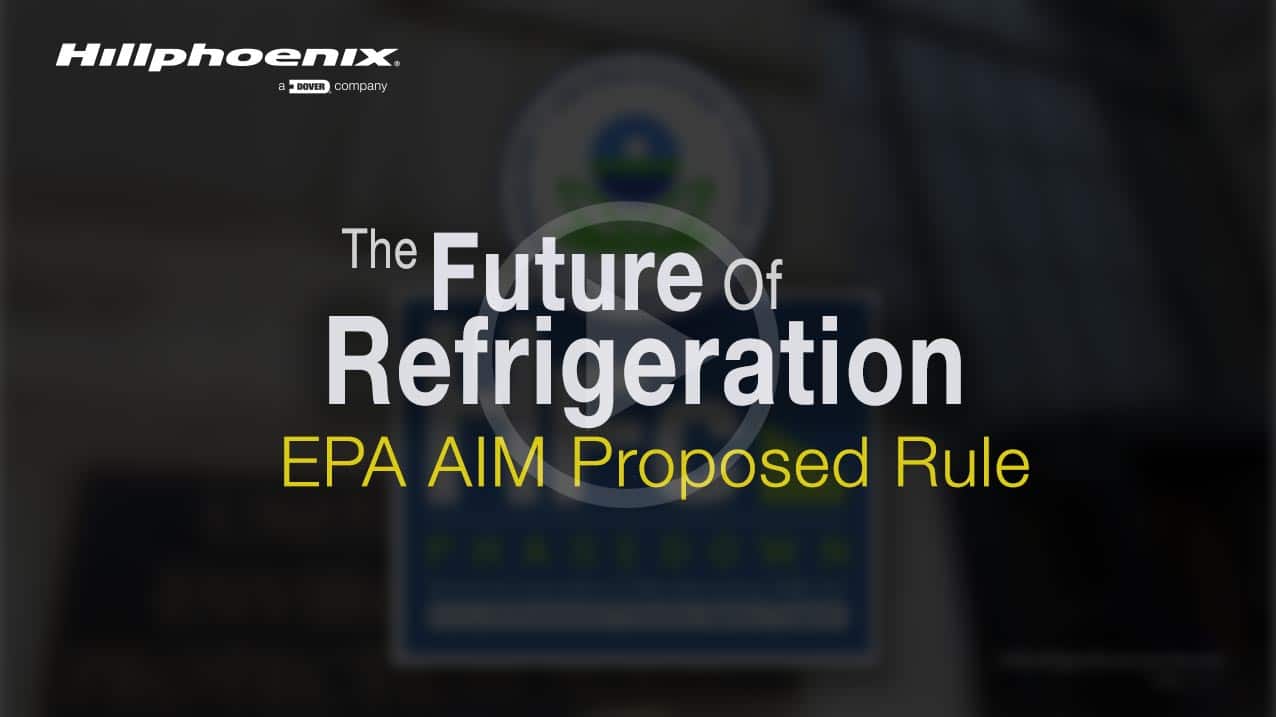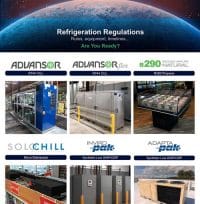Navigating and staying compliant with all of the new retail and commercial refrigeration regulations can seem daunting…
Many of the hydrofluorocarbon (HFC) refrigerants used in commercial refrigeration produce environmentally harmful carbon emissions. As the industry looks for alternative refrigerants with lower global warming potential (GWP) and ozone depletion potential (ODP), questions arise concerning regulatory changes, refrigerant performance and safety. Don’t worry, Hillphoenix offers refrigeration expertise and solutions that satisfy the regulatory needs of today and tomorrow.
The information below offers an overview of important regulations, effective dates, and agencies involved. Links are also provided for additional information on specific regulations. If you have questions, email us at info@hillphoenix.com or call us at 770-285-3264.
Regulatory Agencies

The California Air Resource Board (CARB) is an organization entrusted with educating and safeguarding communities from the harmful effects of air pollution and develops programs that combat climate change. Read more about CARB compliance.

The EPA’s Significant New Alternatives Policy (SNAP) was instituted under Section 612 of the Clean Air Act to identify and evaluate alternatives for ozone-depleting substances. Click here for more information concerning the EPA SNAP regulations.

The Department of Energy (DOE) has put rules and regulations in place impacting the commercial refrigeration industry. Click here to read more.

The Natural Resources of Canada organization is committed to improving the quality of life of Canadians by ensuring the country’s abundant natural resources are developed sustainably, competitively and inclusively. Click here to read more.

The U.S. Climate Alliance, which was established in 2017, is a bipartisan coalition of governors committed to reducing greenhouse gas emissions. Click here to read more.
Latest News
Check back often. We post the latest information when it becomes available.
Click on title to open post.
DOE Accepting Applicants For SBIR/STTR FY 2020 Phase I Release 2 Application Assistance
On December 6, 2019, DOE announced that the applications currently being accepted for free assistance preparing Small Business Innovation Research (SBIR) and Small Business Technology Transfer (STTR) FY 2020 Phase I Release 2 applications. There [...]
New Enforcement Dates for Refrigeration Systems Used in Walk-In Coolers and Freezers
The U.S. Department of Energy (DOE) has established minimum energy efficiency standards that will start to be enforced as early as Jan. 1, 2020, for certain walk-in cooler and freezer (WICF) equipment classes. Read More>
California Air Resource Board Ruling to Ban Certain High GWP Refrigerants
On December 27, 2018 the California Air Resource Board (CARB) passed a ruling to ban certain high GWP refrigerants, effective JANUARY 1st 2019. The ban is in immediate effect and impacts a number of units [...]
Archives
DOE Accepting Applicants For SBIR/STTR FY 2020 Phase I Release 2 Application Assistance
On December 6, 2019, DOE announced that the applications currently being accepted for free assistance preparing Small Business Innovation Research (SBIR) and Small Business Technology Transfer (STTR) FY 2020 Phase I Release 2 applications. There [...]
New Enforcement Dates for Refrigeration Systems Used in Walk-In Coolers and Freezers
The U.S. Department of Energy (DOE) has established minimum energy efficiency standards that will start to be enforced as early as Jan. 1, 2020, for certain walk-in cooler and freezer (WICF) equipment classes. Read More>
California Air Resource Board Ruling to Ban Certain High GWP Refrigerants
On December 27, 2018 the California Air Resource Board (CARB) passed a ruling to ban certain high GWP refrigerants, effective JANUARY 1st 2019. The ban is in immediate effect and impacts a number of units [...]
Additional Resources
CARB – The Refrigerant Management Program (RMP) requires facilities with refrigeration systems containing more than 50 pounds of high-GWP refrigerant to conduct and report periodic leak inspections, promptly repair leaks; and keep service records on site. The regulation also requires service practices intended to minimize refrigerant emissions. Read More>
- CARB Service Technicians
- CARB Distributors/Wholesalers and Reclaimers
- CARB Rules for Businesses with Refrigeration Systems
- SNAP Substitutes in Refrigeration and Air Conditioning
- SNAP Regulations including Rules 19-23
- Questions and Answers About SNAP Alternatives
- EPA Ozone-Depleting Substances – This page provides information on compounds recognized as ozone-depleting substances (ODS) under the Montreal Protocol.
- EPA Stationary Refrigeration Leak Repair Requirements including Section 608 of the Clean Air Act.
- DOE Compliance Certification Database Walk-In Coolers and Freezers – Doors
- DOE Energy Conservation Standards for Walk-in Cooler and Freezer Refrigeration Systems; Final Rule

